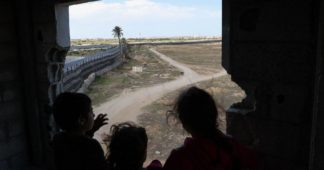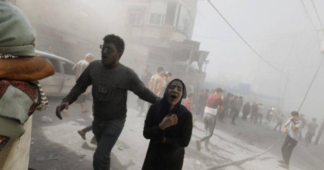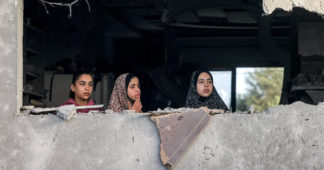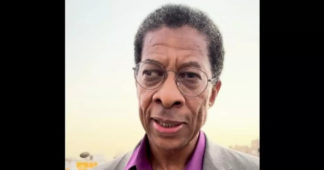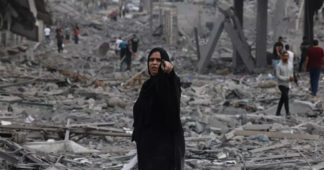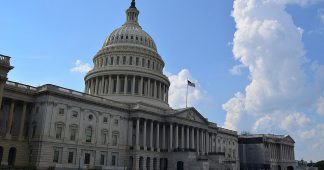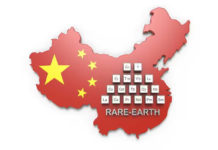Egyptian militia leader Organi unveils plans for ‘Sisi City’ at Israel border
By Shahenda Naguib
May 3, 2024
Just 15km from Rafah, the war-torn Gaza city packed with desperate and hungry Palestinians, a new city is planned to rise in Egypt. It will be named after Abdel Fattah el-Sisi, the Egyptian president who for years has helped impose a blockade on the coastal enclave.
Sisi City was announced by businessman and Sinai militia leader Ibrahim al-Organi on Wednesday, and is scheduled to be built on the site of al-Arjaa, a village in southern Rafah adjacent to the Egypt-Israel border.
Organi has been under scrutiny since the Israeli war on Gaza began, due to the exorbitant fees his companies charge Palestinians fleeing the war to Egypt, and to aid trucks entering the enclave.
One of his firms, Hala, may have earned at least $118m from Palestinian refugees in the past three months, Middle East Eye revealed.
Organi is also the owner of construction company Sons of Sinai, which is the main contractor hired by the Egyptian state for housing projects in the peninsula.
At a lavish celebration secured by armed militiamen and attended by several public figures and MPs on Wednesday, Organi was appointed head of the Arab Tribes Union, a new paramilitary entity uniting five tribal groups from across Egypt under one umbrella.
The event was broadcast on Egyptian intelligence-owned TV channels. The Union has been formed to confront “the challenges facing the nation” and respond to “campaigns of lies and rumours”, attendees were told.
Sisi was declared the group’s “honorary president”. Pro-government talk-show host Mostafa Bakry was appointed as spokesperson.
A tribal source who attended the celebration told MEE that the event did not have any official security presence, “not even traffic police”, and that it was secured instead by armed militiamen in pickup trucks, all of whom belong to Organi’s tribe, the Tarabin.
Prior to merging it with the newly declared union, Organi led the Union of Sinai Tribes (UST), a pro-government paramilitary group set up in 2015 to support the Egyptian army in its battles against a local offshoot of the Islamic State (IS). The UST’s mission in Sinai has been unclear since the IS-affiliate group known as the Sinai Province was officially defeated in 2022.
The bloody, 10-year campaign in the Sinai has almost completely razed Rafah and uprooted thousands of members of the indigenous Bedouin population, leaving most towns and villages pulverised.
MEE has previously investigated the tribal faction’s involvement in extrajudicial killings. Sinai expert and security analyst Mohannad Sabry has described the UST as a “rogue entity” and “illegal outfit”.
MEE has asked the Organi Group for comment.
During Wednesday’s event, the militiamen wore uniforms that resembled those of the Egyptian army, and all their trucks bore the new organisation’s logo, as well as pictures of Sisi and Organi next to each other.
Organi, who usually appears at public events in a large, heavily armoured motorcade with several security personnel, was the centre of the celebration. He showed up with around 30 cars securing him and his entourage.
“They drove very fast and close to each other in their Cadillac Escalades. They made a little sand storm, as all the roads leading to the big tent where the conference was held are sandy roads,” the source said.
Wearing traditional tribal clothes, Organi said in a TV interview that the area where the new city is going to be built was a “playground for takfiris”.
“Today we are building and developing. And the first to be given apartments in this city will be the families of the martyrs who died fighting terrorism,” he said.
The former chairman of the parliamentary Arab affairs committee was appointed as the union’s vice president, while ex-state security officer Major General Ahmed Deif Saqr was appointed co-vice president.
“The Union is formed at a critical moment in the history of the nation, as many are eager to lay their hands on Sinai,” Abdallah Salem Gahama, a member of the new group, told MEE.
“We must be one hand and forget any disputes and stand behind our leadership,” added Gahama, who is a senior tribal figure in the Sinai peninsula.
While the conference speakers did not directly comment on the construction of Sisi City, Gahama said it will be a message to both “doubters of the state’s intention to develop Sinai and those who want Sinai to be the solution for the Israeli war on Gaza”, a reference to suggestions from some Israeli officials that Palestinians can be ejected into the peninsula.
“The construction and development of Sinai is a response to the plots of Israel and Netanyahu, as they want Egypt to host the Palestinians. We refuse the displacement of our Palestinian brothers,” he said.
‘They are all collaborators’
Wednesday’s event triggered traumatic flashbacks for Moemen, a 32-year-old Palestinian whose family were charged $20,000 by Organi’s company, Hala, to escape Israel’s war on Gaza and cross to Egypt.
“I wonder how many families had to spend all their savings and live in debt for the rest of their lives to allow Organi to ride a car worth some $170,000,” he told MEE, while watching a video of the tribal leader arriving at the conference in his motorcade.
Sinai residents have had a complicated relationship with local paramilitaries since they began working with the army to defeat IS. Over the past decade, fighters have been involved in gathering intelligence and assisting the police and military in arresting suspects.
Sanaa, a 57-year-old farmer in Sheikh Zuweid, expressed her distrust in the UST and the new union, calling it “Organi’s men”.
“They are all collaborators for whoever pays more,” Sanaa said. “They have no Bedouin values.”
The farmer, who was displaced from the Egyptian side of Rafah during the army’s campaign against IS, accused the UST and its men of arbitrarily arresting her brother and presenting false information indicating that he worked with militants in 2020.
Mourad, 25, was also displaced from Rafah during the war on IS in 2016. He is now a teacher in North Sinai’s al-Arish.
His family’s house and farm in Rafah, and the houses of hundreds of others, were destroyed when Egypt decided to build a buffer zone that it said would limit IS presence in the region.
“Now I can only see Rafah from Google maps, and try to track where our street was and where I used to go to play football,” he said.
“I cannot look at these new pictures of yellow blocks of buildings,” added Mourad, referring to photos of the New Rafah city, an Organi-led development on the same site, that includes 272 residential buildings.
“Seeing the name of the man who ordered our displacement written on our city is a humiliation and defeat.”
We remind our readers that publication of articles on our site does not mean that we agree with what is written. Our policy is to publish anything which we consider of interest, so as to assist our readers in forming their opinions. Sometimes we even publish articles with which we totally disagree, since we believe it is important for our readers to be informed on as wide a spectrum of views as possible.
